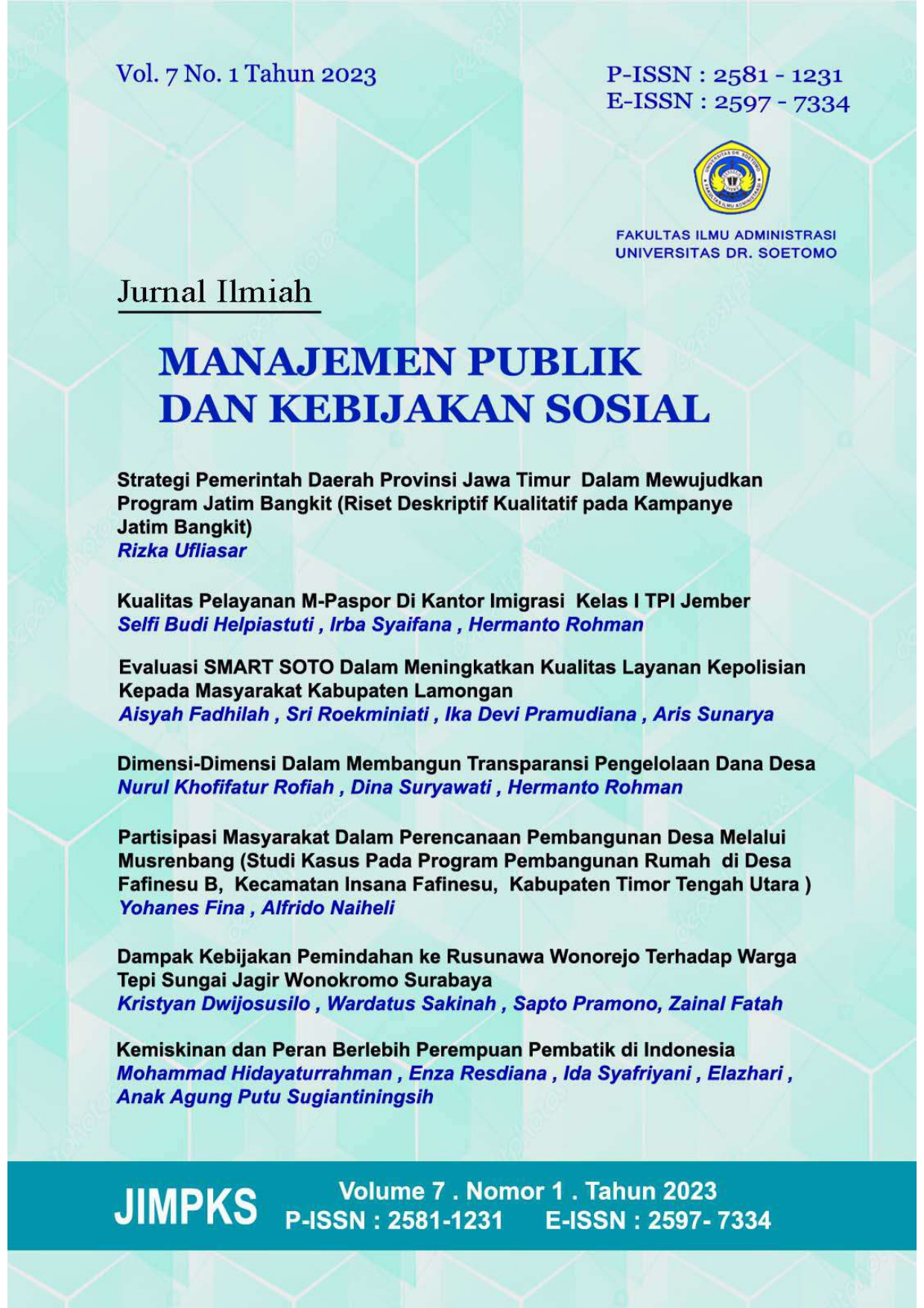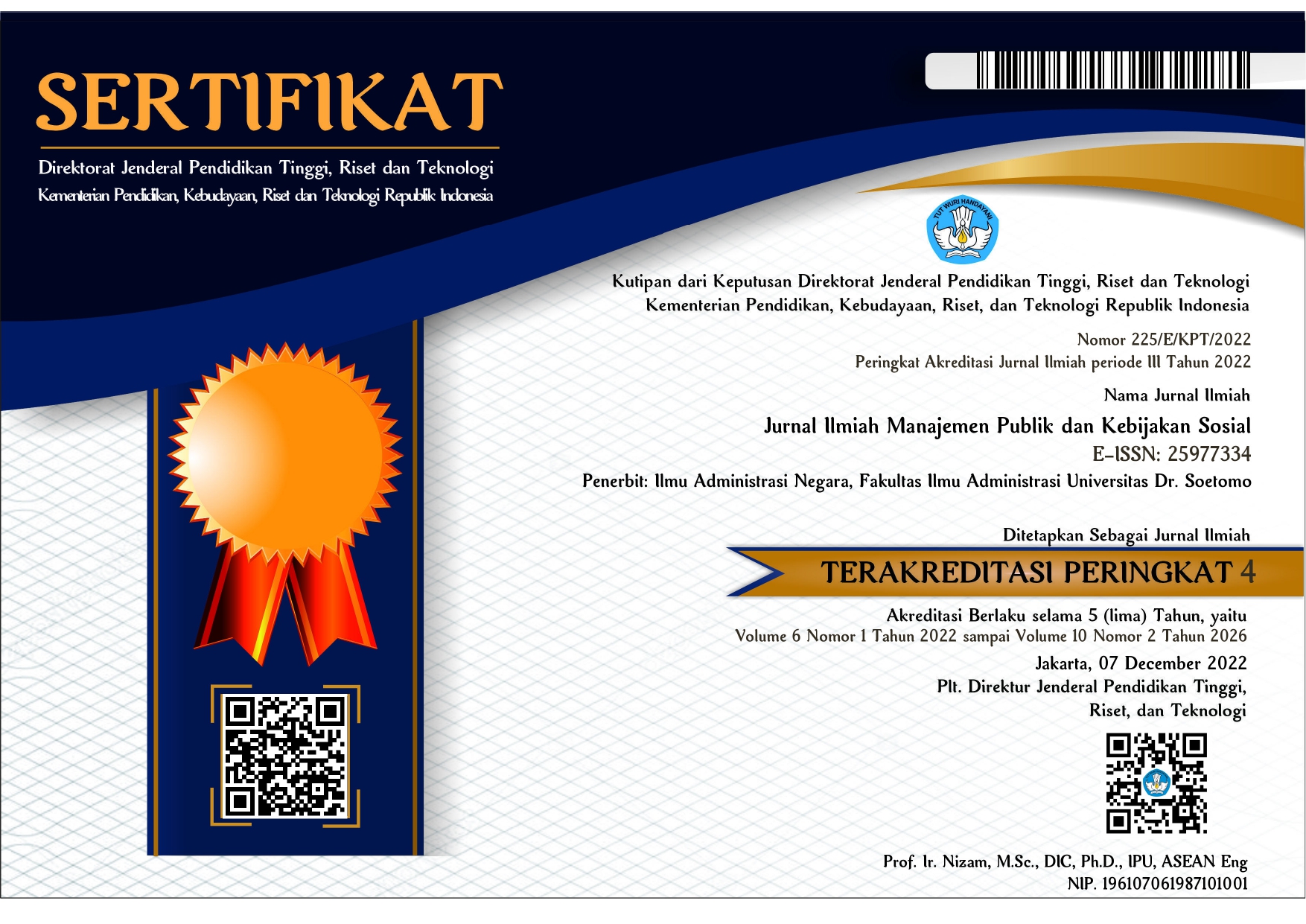Evaluasi SMART SOTO Dalam Meningkatkan Kualitas Layanan Kepolisian Kepada Masyarakat Kabupaten Lamongan
 Abstract views: 236
,
Abstract views: 236
,
 PDF (Bahasa Indonesia) downloads: 268
PDF (Bahasa Indonesia) downloads: 268
Abstract
The service program policy through the SMART SOTO application is one of the programs initiated by the East Java Regional Police with several Polres ranks, one of which is the Lamongan Police which aims to improve the quality of police services at the Lamongan Police, one of which is the SIM service. The background to the launch of the SMART SOTO Lamongan application was the desire to provide the best service to the community and also to minimize cases of illegal levies during SIM services. The aims of this study were to describe and analyze data: 1) The performance of the SMART SOTO program's policies in improving the quality of police services to the people of Lamongan district and 2) What factors supported and hindered the implementation of the SMART SOTO program in Lamongan District. This study uses evaluation indicators from Willim N. Dunn. This study uses data collection techniques based on interviews, documentation and observation. The results of this study show that the SMART SOTO program, especially SIM services, has demonstrated timeliness, service users, especially young people, are very high, but those aged 30-40 and above are still lacking. In addition, this program is supported by several agencies in Lamongan Regency. The benefits have been felt by the people of Lamongan Regency, this program has been socialized in various crowded places such as the Alun-alun and several sub-districts as well as outreach via Facebook. The SMART SOTO program has shown satisfaction. The SMART SOTO program has become the best choice for the people of Lamongan Regency. Suggestions from researchers should socialization be carried out per village or sub-district so that it reaches more people, the application is only available for the Android version, so it is better if it is upgraded with another version such as iOS, it is necessary to schedule an update for the SMART SOTO application.
References
Akhmaddhian, S. (2014). Reformasi Birokrasi Bidang Perizinan Berdasarkan Undang-Undang Nomor 25 Tahun 2009 Tentang Pelayanan Publik (Studi di Kabupaten Bogor). Sosiohumaniora, 16(2), 206-214.
Anggara, S. (2018). Pengantar Kebijakan Publik. CV Pustaka Setia.
Anggito, A., & Setiawan, J. (2018). Metodologi penelitian kualitatif. CV Jejak (Jejak Publisher).
Danendra, I. B. K. (2013). Kedudukan dan Fungsi Kepolisian dalam Struktur Organisasi Negara Republik Indonesia. Lex Crimen, 1(4).
Dunn, W. N. (2003). Pengantar Analisis Kebijakan Publik. UGM Press.
Fandy Tjiptono (2000) Manajemen Pemasaran. Yogyakarta: Andi Offset.
Farlina, Y., & Pribadi, D. (2020). Sistem Informasi Pelayanan Publik Di Kecamatan Warudoyong Kota Sukabumi Berbasis Website. IJCIT (Indonesian Journal on Computer and Information Technology), 5(02), 180-186.
Inayatullatifah, A. (2022). Efektivitas Layanan Hukum Posbakum Bagi Masyarakat Tidak Mampu Di Pengadilan Agama Batang Berdasarkan Keputusan Menpan Nomor 63 Tahun 2003.
Indonesia, P. R. (2003). Instruksi Presiden Republik Indonesia Nomor 3 Tahun 2003 tentang Kebijakan dan Strategi Nasional Pengembangan E-Government. Jakarta: Sekretaris Negara.
Indonesia. (2007). Undang-undang RI No. 14 Tahun 1992 Tentang Lalu-lintas dan Angkutan Jalan. VisiMedia.
Mahsyar, A. (2011). Masalah Pelayanan Publik di Indonesia Dalam Perspektif Administrasi Publik. Otoritas : Jurnal Ilmu Pemerintahan, 1(2), 81–90. https://doi.org/10.26618/ojip.v1i2.22
Mutia, I. F. (2017). Analis Kebijakan Publik (Issue April).
Nabila, D. R. N., & Niswah, F. (2019). Analisis Keberhasilan Teknologi Informasi SMART SOTO LA (Sistem Operasional Terpadu Online Lamongan) di Kantor Kepolisian Resort (Polres) Lamongan (Studi Pada Pelayanan Pengurusan Surat Izin Mengemudi). Publika, 7.
Pambayun, D. P. L., & Oktariyanda, T. A. (2021). KUALITAS LAYANAN GO ONLINE SEBAGAI BENTUK CORPORATE SOCIAL RESPONSIBILITY PEMBINAAN PELAKU USAHA MIKRO KECIL DAN MENENGAH DI RUMAH BUMN BANK MANDIRI SURABAYA. Publika, 9(3), 97-108.
PRASETYO, S., & Warsono, H. (2017). Pengembangan E-Government di Dinas Pendidikan dan Kebudayaan Kota Semarang. Journal of Public Policy and Management Review, 6(4), 70-86.
Putra, A. (2022). STRATEGI PEMERINTAH DESA DALAM MENINGKATKAN KUALITAS PELAYANAN PUBLIK DI DESA KUMUN HILIR KECAMATAN KUMUN DEBAI KOTA SUNGAI PENUH: AIDIL PUTRA, NANIK MANDASARI, MASNON. JURNAL ADMINISTRASI NUSANTARA MAHA, 4(3), 26-44.
Subarsono, A. (2013). ANALISIS KEBIJAKAN PUBLIK Konsep Teori dan Aplikasi. Pustaka Pelajar.
Subarsono, A. (2013). ANALISIS KEBIJAKAN PUBLIK Konsep Teori dan Aplikasi. Pustaka Pelajar.
Tri Priyono. (2022). Evaluasi Kebijakan Program Smart City Oleh Dinas Komunikasi Dan Informatika Di Kabupaten Cirebon. Doctoral Dissertation, INSTITUT PEMERINTAHAN DALAM NEGERI, 10, 1–23.
Sumber Lain:
ombudsman.go.id (https://ombudsman.go.id/news/r/ombudsman-ri-luncurkan-laporan-tahunan-2020)
Undang-Undang Nomor 25 Tahun 2009 tentang Pelayanan Publik
Undang-Undang Nomor 22 Tahun 2009 Tentang Lalu Lintas dan Angkutan Jalan
Copyright (c) 2023 Aisyah Fadhilah, Sri Roekminiati, Ika Devy Pramudiana, Aris Sunarya

This work is licensed under a Creative Commons Attribution-ShareAlike 4.0 International License.
Authors who publish with JIMPKS: Jurnal Ilmiah Manajemen Publik dan Kebijakan Sosial agree to the following terms:
-
Authors retain copyright and grant the journal right of first publication with the work simultaneously licensed under a Creative Commons Attribution License (CC BY-SA 4.0) that allows others to share the work with an acknowledgment of the work's authorship and initial publication in this journal.
-
Authors are able to enter into separate, additional contractual arrangements for the non-exclusive distribution of the journal's published version of the work (e.g., post it to an institutional repository or publish it in a book), with an acknowledgment of its initial publication in this journal.
-
Authors are permitted and encouraged to post their work online (e.g., in institutional repositories or on their website) prior to and during the submission process, as it can lead to productive exchanges, as well as earlier and greater citation of published work.










